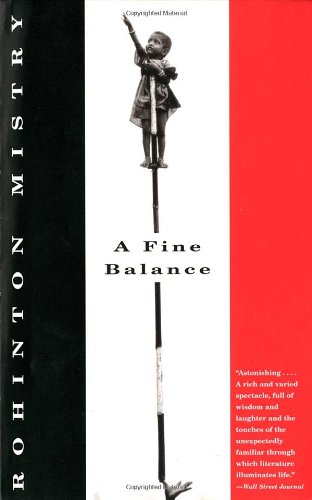[amazon_link id=”140003065X” target=”_blank” container=”” container_class=”” ] [/amazon_link]Title : A Fine Balance
[/amazon_link]Title : A Fine Balance
Author : Rohinton Mistry
Narrator : John Lee
Genre : Society/Culture
Listening Length : 24 hours and 29 minutes
Pages : 603
Rating : 5/5
“A Fine Balance” is quite a tome. I realized this when I tried to download it from the local library to my Android phone, via the Overdrive app. The MP3 version of the audio-book took forever to download – it has 20 parts, and each part is roughly an hour. The local library lets you borrow the book for two weeks at a time, after which the title expires and is unavailable. If you are like me and listen to audiobooks only on the work commute, and not every day at that, it can take up to 4 re-checkouts and re-downloads before you are able to finish listening to this majestic masterpiece.
A Fine Balance is about conditions in India in the mid 1970s. Indira Gandhi is the prime minister, although she is never actually named, and she has invoked the Emergency. The 1970s are (amazingly and despairingly) similar to current times in that there is widespread corruption, and the little people have it bad. To top it all, the government has invoked stricter rules to clean up the slums/poorer sections of the city and the family planning project is underway. The novel is set in a bustling, populous unnamed seaside city (probably Bombay, now Mumbai – indeed, renaming cities is the one thing the Indian political class seems to do well).
The novel has 4 main characters : Dina Dalal, a Parsi widow who must fend for herself because she does not wish to go begging to her overbearing, ever critical elder brother Nusswan, her paying-guest Maneck Kohlah who is attending the college in the city and away from home, and two tailors Ishvar and Omprakash Darji, who have come to Bombay from their little town to seek out a better life. Mistry writes in exquisite detail about these four characters and other peripheral characters like Ibrahim, Dina’s landlord’s rent-collector, or Dukhi, Om’s father, an untouchable who has decided to flout the rigidly held caste restraints to allow his sons to pursue other professions.
Via his characters Mistry touches upon various social ills – the corruption, the breakdown of law and order, the caste system which is still prevalent in orthodox India, the hypocrisy, the decaying justice system, and the poor status of women in society. To those unfamiliar with India, and the plight of the middle and lower classes, this book might appear to be a compendium of bleakness, of desolate and stark anecdotes. To me, and I must admit I am (sadly) somewhat inured to descriptions of India’s poverty and squalor, A Fine Balance was about living life with dignity and courage even when that life was hard and miserable. The title itself comes from the words of a peripheral character Maneck meets on a train journey, and the words refer to the fine balance between hope and despair.
This is a long and leisurely novel, and Mistry takes his time describing the minutiae of his character’s lives. Pages and pages of detail describe dress, manner, personality, living conditions, facial features, habits, customs, locales and ideas and much, much more. No detail is too paltry to be overlooked. This results in creating a very clear picture of the people in this book; it is like we are there with the characters, face to face. We get to know them really well and become strongly invested in their lives. You might think that with so much detail, the plot might meander or get swept away in pedantic details, but Mistry is a magician with words. He is skilled at creating worlds where we wander in and are content to look around and stay and listen and absorb all the intricacies which compose daily life, bleak though that life might be.
The book is narrated by John Lee who reads well, and gives nuance and depth to the characters. The problem I found with his reading was his Anglicized pronunciation of Indian vernacular like “jhoppadpatti”, or “Om” which he pronounced as rhyming with “gone” instead of “gore”- makes me wonder if they couldn’t have gotten an Indian consultant on the reading. Also while trying to sound like an Indian might, Lee tends to flatten his sounds a little more than necessary. This bothered me initially, but after a few chapters I got used to it, and it did not detract from the pleasure of this book after all. If you think that the mispronunciation will bother you, you might try and get hold of the abridged audiobook (6 hours) read by Madhur Jaffrey.
This is a gorgeous book and a must read/listen.


Sounds quite interesting. I feel like I should read more non-fiction audiobooks when reading reviews like this. Nice recommendation! 🙂
Thanks Mike! And welcome to my blog!
[…] form this comes in at a whopping 32 hours! The longest audiobook I’ve listened to before this is Rohinton Mistry’s A Fine Balance which was a long 24 hours, although so finely written that one didn’t quite notice the hours […]